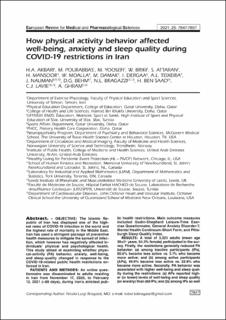How physical activity behavior affected well-being, anxiety and sleep quality during COVID-19 restrictions in Iran
Akbari, H.A.; Pourabbas, M.; Yoosefi, M.; Briki, W.; Attaran, S.; Mansoor, H.; Moalla, W.; Damak, M.; Dergaa, I.; Teixeira, A.L.; Nauman, Javaid; Behm, D.G.; Bragazzi, N.L.; Ben Saad, Saad; Lavie, Carl J.; Ghram, Amine
Peer reviewed, Journal article
Published version

Åpne
Permanent lenke
https://hdl.handle.net/11250/3043151Utgivelsesdato
2021Metadata
Vis full innførselSamlinger
Originalversjon
European Review for Medical and Pharmacological Sciences. 2021, 25 (24), 7847-7857. 10.26355/eurrev_202112_27632Sammendrag
OBJECTIVE: The Islamic Republic of Iran has displayed one of the highest rates of COVID-19 infection in the world and the highest rate of mortality in the Middle East. Iran has used a stringent package of preventive health measures to mitigate the spread of infection, which however has negatively affected individuals’ physical and psychological health. This study aimed at examining whether physical-activity (PA) behavior, anxiety, well-being, and sleep-quality changed in response to the COVID-19-related public health restrictions enforced in Iran.
PATIENTS AND METHODS: An online questionnaire was disseminated to adults residing in Iran from November 17, 2020, to February 13, 2021 (~88 days), during Iran’s strictest public health restrictions. Main outcome measures included Godin-Shephard Leisure-Time Exercise Questionnaire, General Anxiety Disorder-7, Mental Health Continuum-Short Form, and Pittsburgh Sleep Quality Index.
RESULTS: A total of 3,323 adults (mean age 30±11 years, 54.3% female) participated in the survey. Firstly, the restrictions generally reduced PA behavior: (a) among inactive participants (IPs), 60.6% became less active vs. 5.1% who became more active; and (b) among active participants (APs), 49.9% became less active vs. 22.8% who became more active. Secondly, PA behavior was associated with higher well-being and sleep quality during the restrictions: (a) APs reported higher (or lower) levels of well-being and sleep quality (or anxiety) than did IPs; and (b) among IPs as well as among APs, the more active the participants, the greater (or lower) the levels of well-being and sleep quality (or anxiety).
CONCLUSIONS: This study showed the beneficial role of PA behavior for well-being, anxiety, and sleep quality during the COVID-19 restrictions, whereas such restrictions appeared to decrease PA participation. Active lifestyle should be then encouraged during the COVID-19 outbreak while taking precautions.
